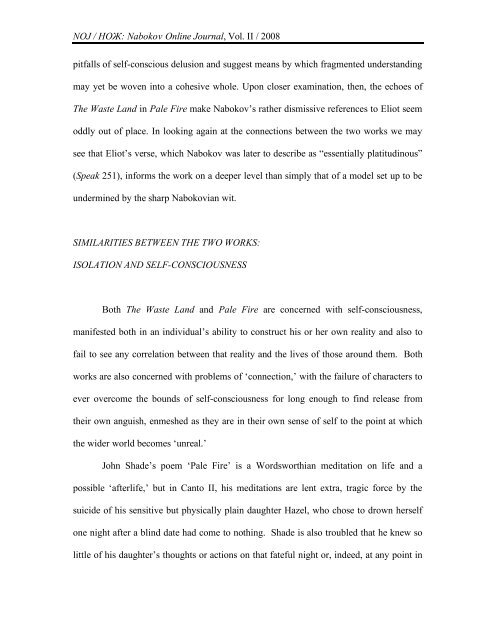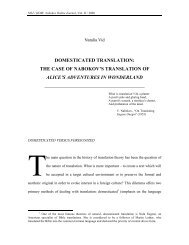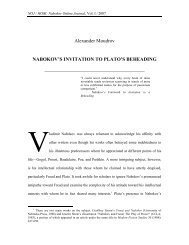musing upon the king's wreck - Electronic Text Centre
musing upon the king's wreck - Electronic Text Centre
musing upon the king's wreck - Electronic Text Centre
Create successful ePaper yourself
Turn your PDF publications into a flip-book with our unique Google optimized e-Paper software.
NOJ / НОЖ: Nabokov Online Journal, Vol. II / 2008<br />
pitfalls of self-conscious delusion and suggest means by which fragmented understanding<br />
may yet be woven into a cohesive whole. Upon closer examination, <strong>the</strong>n, <strong>the</strong> echoes of<br />
The Waste Land in Pale Fire make Nabokov’s ra<strong>the</strong>r dismissive references to Eliot seem<br />
oddly out of place. In looking again at <strong>the</strong> connections between <strong>the</strong> two works we may<br />
see that Eliot’s verse, which Nabokov was later to describe as “essentially platitudinous”<br />
(Speak 251), informs <strong>the</strong> work on a deeper level than simply that of a model set up to be<br />
undermined by <strong>the</strong> sharp Nabokovian wit.<br />
SIMILARITIES BETWEEN THE TWO WORKS:<br />
ISOLATION AND SELF-CONSCIOUSNESS<br />
Both The Waste Land and Pale Fire are concerned with self-consciousness,<br />
manifested both in an individual’s ability to construct his or her own reality and also to<br />
fail to see any correlation between that reality and <strong>the</strong> lives of those around <strong>the</strong>m. Both<br />
works are also concerned with problems of ‘connection,’ with <strong>the</strong> failure of characters to<br />
ever overcome <strong>the</strong> bounds of self-consciousness for long enough to find release from<br />
<strong>the</strong>ir own anguish, enmeshed as <strong>the</strong>y are in <strong>the</strong>ir own sense of self to <strong>the</strong> point at which<br />
<strong>the</strong> wider world becomes ‘unreal.’<br />
John Shade’s poem ‘Pale Fire’ is a Wordsworthian meditation on life and a<br />
possible ‘afterlife,’ but in Canto II, his meditations are lent extra, tragic force by <strong>the</strong><br />
suicide of his sensitive but physically plain daughter Hazel, who chose to drown herself<br />
one night after a blind date had come to nothing. Shade is also troubled that he knew so<br />
little of his daughter’s thoughts or actions on that fateful night or, indeed, at any point in
















